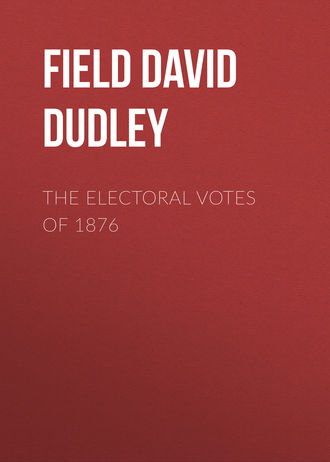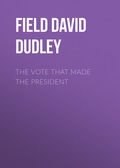
Field David Dudley
The Electoral Votes of 1876
"To the Honorable the Senate and House of Representatives:
"The joint resolution entitled 'joint resolution declaring certain States not entitled to representation in the electoral college,' has been signed by the Executive, in deference to the view of Congress implied in its passage and presentation to him. In his own view, however, the two Houses of Congress, convened under the twelfth article of the Constitution, have complete power to exclude from counting all electoral votes deemed by them to be illegal, and it is not competent for the Executive to defeat or obstruct that power by a veto, as would be the case if his action were at all essential in the matter. He disclaims all right of the Executive to interfere in any way in the canvassing or counting electoral votes, and also disclaims that by signing said resolution he has expressed any opinion on the recitals of the preamble, or any judgment of his own upon the subject of the resolution."
If this resolution of the two Houses was authorized by the Constitution, there is no ground for maintaining the power of the President of the Senate to decide the question of receiving or rejecting votes. For, if he has the power under the Constitution, he cannot waive it, nor can any action of Congress take it away. The resolution of 1865 had the sanction of each House, was signed by the President of the Senate and the Speaker of the House, and was approved by the President. It should set the question of the power of the two Houses forever at rest.
The joint rule, first adopted in 1865, and continued in force for ten years, asserted the same control. It should not have been adopted if the pretensions now set up for the President of the Senate were of force; and he might at any time have disregarded it as worthless. But he did not disregard it; he did not question it; he obeyed it.
The action of the present Houses, moreover, is an affirmance of their right to eliminate the false votes from the true. Else why these committees of each House, investigating at Washington and in the North and South? Are all the labor and expense of these examinations undertaken solely in order that the results may be laid before the President of the Senate for his supreme judgment in the premises? It is safe to say that there is not a single member of either House who would not laugh you in the face for asking seriously the question.
Assuming, then, that the power to decide what votes shall be counted belongs to the two Houses, how must they exercise it? Here, again, let me take the illustration with which I began, of the coins upon a banker's counter. Let us suppose that, instead of one clerk, two were told to count them together. When they came to a particular coin upon which they disagreed, one insisting that it was genuine and the other that it was counterfeit, what would then happen, if they did their duty? They would count the rest and lay that aside, reporting the disagreement to their superior. The two Houses of Congress have, however, no superior, except the States and the people. To these there can be no reference on the instant; and the action of the two Houses must be final for the occasion.
There can be no decision of the Houses if they disagree, and, as no other authority can decide, there can be no decision at all. The counting, including the selection, is an affirmative act; and as two are to perform it, if performed at all, no count or selection can be made when the two do not concur. Two judges on the bench cannot render a judgment when there is a disagreement between them. No more can the two Houses of Congress. There is here no pretense of alternative power, playing back and forth between the President of the Senate and the two Houses. If the former has not power complete and exclusive, he has none. The result must be that, what the two Houses do not agree to count, cannot be counted.
What Votes should be counted
This is the second question. The votes to be counted are the votes of the electors. But who are the electors? The persons appointed by the States, in the manner directed by their Legislatures respectively. How is the fact of appointment to be proved? These are the subordinate questions, the answers to which go to make up the answer to the main question.
What are the means of separating the genuine from the counterfeit? Where are the tests by which to distinguish the true votes from the false?
The words of the Constitution are not many: "Each State shall appoint, in such manner as the Legislature thereof may direct, a number of electors," who shall meet and vote, "make distinct lists of all persons voted for as President" … "and of the number of votes for each, which list, they shall sign and certify and transmit sealed to the seat of the Government of the United States, directed to the President of the Senate."
The State must appoint, and the appointment must be made in such manner as the Legislature thereof may direct. Here are the two elements of a valid appointment, and they must concur. An appointment not made by the State, or not made in the manner directed by its Legislature, is no appointment at all.
There must be State action in the manner directed. If, for example, an appointment were made by a State authority, such as the Governor, without the sanction of the Legislature, it would be void. If it were made by the people in mass-convention, but not in a manner directed by the Legislature, it would be void also. And if, on the other hand, it were made in such manner as the Legislature had directed, but not made by the State, it would be equally invalid. Indeed, the Legislature may itself have given a direction in contravention of the State constitution, and thus the direction prove a nullity. So, too, the Legislature may have acted in contravention of the Federal Constitution, and for that reason its direction may have been void. The appointing power is the State, the manner of its action is prescribed by the Legislature; the valid authority and the valid manner of its exercise must concur, to make a valid appointment.
If, therefore, the persons assuming the office are not appointed by the State, and in the manner directed by the Legislature, they are not electors; that is to say, they are not electors de jure; electors de facto they can hardly become, since their functions exist but for a moment, and with one act they perish. What is an appointment by the State? How can a State appoint? I answer, by the people, the corporators of the body politic and corporate, or by one of the departments of its government, as established by its constitution. The power to appoint cannot be renounced or divested. It must ever remain in the State, a living power, to be called into action at each recurring election. It cannot be delegated, except as the different powers of the State are by its constitution delegated to its great departments of government. If it were otherwise, it might be delegated to a foreign prince, and delegated in perpetuity. It is no answer to say that such a delegation would not be made, the question is, whether it could be made, without violating the Constitution of the country? I insist that it could not; and that if the Legislature of New York were to authorize our friend the Emperor Alexander, or our excellent neighbor the Governor-General of Canada, to appoint the thirty-five presidential electors to which New York is entitled in the sum total of the electoral colleges, and the electors thus appointed were to receive the certificate of the Governor of New York, and to meet, vote, and transmit their certificates to Washington, the votes might be lawfully rejected. Such an occurrence is in the highest degree improbable; but stranger things than that have happened. The Empress Catharine intervened in the election of the kings of Poland, and the interference led to the downfall of the government and the blotting of the country from the map of Europe. Indeed, I venture to express my belief, that such an intervention of foreign influence in our elections would have been hardly more startling to the imaginations of our fathers than the spectacle which our own eyes have seen; federal soldiers removing representatives from the Capitol of one State, and stationed at the doors of another, to inspect the certificates of members elected to its Legislature.



